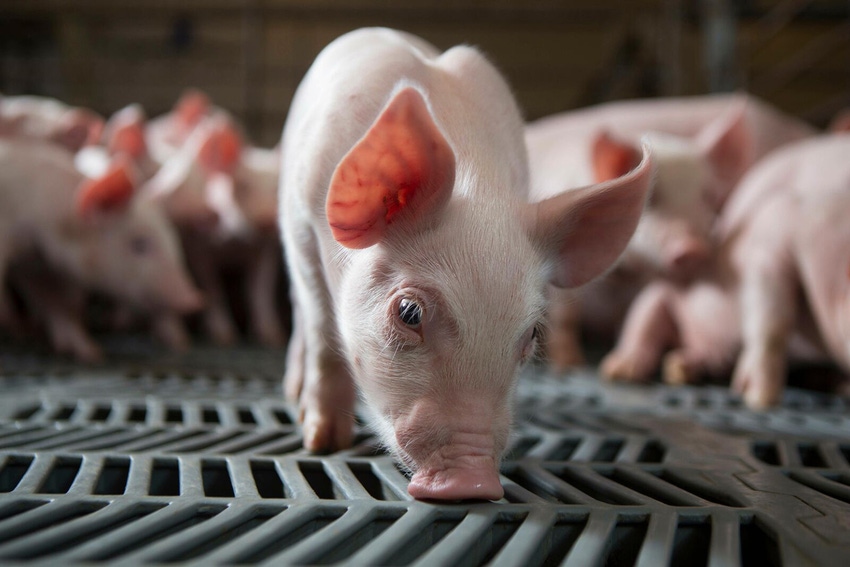Leading a path forward for sustainability of pork production
ManureDB, iFEEDER roadmap and amino acid optimization among topics featured during the 2023 Minnesota Nutrition Conference and the Allen D. Leman Swine Conference.
October 12, 2023

By University of Minnesota
The 2023 Minnesota Nutrition Conference and the Allen D. Leman Swine Conference are prominent events in the world of animal nutrition and swine health and management. This article provides an overview of the conference’s programs, highlighting the key sessions and speakers focusing on the topic of sustainability.
At the Minnesota Nutrition Conference, Lara Moody, from the Institute for Feed Education and Research at American Feed Industry Association, kicked off the day with a talk on sustainability tools available for stakeholders of AFIA. She discussed the importance of sustainable practices in today's world, emphasizing the need for conscientious approaches to feed formulation. Animal sourced foods currently account for 11% of global greenhouse gas emissions and 12% of global water consumption, and are responsible for 65% of global land use change. It is imperative that the feed industry advances sustainability efforts such as responsible feed ingredient sourcing, regenerative agriculture practices, circular ingredient supply, and application of feeding innovations that mitigate GHG emissions.
Therefore, iFEEDER developed a roadmap to assist companies in the sustainability planning process. This roadmap includes three major steps: crawl (leadership buy-in, return on investment and tailor framework), walk (identify needs, engage, set objectives), and run (communicate, track progress, engage suppliers). Some projects can merge business needs for dependable power supply with technologies of low environmental impacts (e.g., The Maschhoffs Feed Mill).
Depending on the project, animal nutrition business may choose to prepare feeding programs that mitigate the environmental footprint of the diets. In this regard, the Global Feed LCA Institute Director, Delanie Kellon, provided an overview of the methodology and scientific rigor of developing the database. The day concluded with a presentation by David Dayhoff from DSM firmenich, who shared tools and experiences in sustainability, encouraging attendees to incorporate sustainable practices into their work.
The 2023 Minnesota Nutrition Conference served as a platform for experts to share their knowledge and discuss the latest developments in the field. From sustainability in the feed industry to the microbiome of various animal species, the conference program offered a comprehensive overview of nutrition science. Attendees left the event with a deeper understanding of the challenges and opportunities in nutrition, poised to make a positive impact on the industry and the world at large. As the field of nutrition continues to evolve, events like these play a pivotal role in fostering innovation and collaboration among nutrition professionals.
In addition to presentations on sustainable animal feeding programs, the Allen D. Leman Swine Conference is renowned for its commitment to advancing knowledge and innovation in the swine industry. In this year's conference, three outstanding presentations took center stage, each contributing valuable insights to the field of sustainability.
Erin Cortus from the University of Minnesota, with sponsorship from the National Pork Board, delivered a groundbreaking presentation on "ManureDB: Accessing Past and Present U.S. Manure Nutrient Data." This presentation highlighted the importance of understanding the value of manure in sustainable agriculture. Erin introduced ManureDB, an innovative tool that provides access to a wealth of historical and contemporary data regarding manure nutrient content in the United States. The audience gained a profound appreciation for the potential of manure as a valuable resource, not just as waste. Erin's work emphasized the importance of data-driven decision-making in optimizing nutrient management and promoting sustainable agricultural practices.
Anna Cates, also from the University of Minnesota, explored "Soil Health Principles and Manure in Rotation." This presentation showcased the integral role of soil health in swine agriculture. Anna illuminated how incorporating manure into crop rotation strategies can have a profound impact on soil fertility, structure, and sustainability. By outlining the synergistic relationship between manure and soil health, Anna provided attendees with a blueprint for harnessing manure as a sustainable resource that benefits both the environment and crop yields. Her presentation underscored the importance of environmentally responsible farming practices in the swine industry.
In a collaborative effort, Christian Ramirez-Camba and Pedro E. Urriola from the University of Minnesota presented "Optimizing Amino Acid Intake to Improve Animal Health While Reducing Nitrogen Footprint." Their work addressed the delicate balance between animal nutrition and environmental responsibility. By optimizing amino acid intake, they demonstrated how animal health can be enhanced while simultaneously reducing the nitrogen footprint associated with swine production. This presentation exemplified the conference's overarching theme of responsible and sustainable swine agriculture, offering valuable insights into the intersection of animal welfare and ecological stewardship.
These presentations at the Allen D. Leman Swine Conference exemplified the event's commitment to advancing knowledge and innovation in the swine industry. They showcased the importance of data-driven decisions in managing manure nutrients, highlighted the significance of soil health principles in crop rotation, and introduced innovative strategies for optimizing amino acid intake to promote animal health and environmental sustainability. Together, these presentations illuminated the path toward more responsible and sustainable swine production, ensuring a brighter and more eco-friendly future for the industry.
You May Also Like



